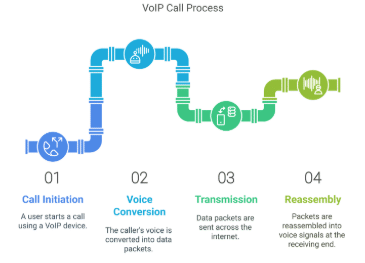If we go back just a little in time, businesses communicated with their customers, employees and other companies through traditional analogue phones. Times have progressed and people are looking for smart replacements for everything. Nowadays, businesses prefer VoIP systems for an internet-based connection for daily communication.
What exactly is the reason for the increasing switch from analogue phones to VoIP? We will take a detailed look at it.
What is an analogue phone line?
An analogue phone line is your traditional phone that uses physical wires for its setup. Analogue phone lines are also known as PSTN (Public Switched Telephone Network) lines. Specifically, voice signals get connected to electric current and travel via copper wires.
Since the system is entirely physical, it also faces wear and tear over time which increases its maintenance requirements. Traditional phones have been around for ages so they offer limited features as compared to new solutions in the market.
The reason why businesses in the UK are switching from analogue is because the Big Switch Off will take place when the PSTN services end. These services will then be replaced by VoIP.
According to Bionic.co.uk, the digital switchover, which will cause landlines to be switched off, has been delayed to 2027 from 2025.
Compare VoIP Phone System Quotes Today
VoIP & its working
VoIP systems work differently than traditional; analogue phone lines as it is completely internet-dependent without any need for physical wires. Instead of sending voice over electric frequencies, VoIP transmits it in data packets which is again, the internet. Here’s how VoIP works:
- A user starts a call using a specific VoIP phone, or any other desk phone or mobile device connected to the internet. Internet connectivity is a must here.
- The caller’s voice is transformed into data or IP packets.
- These data packets are sent across an internet connection to the person on the other end of the call.
- The packets are then reassembled into voice signals.

Benefits of VoIP vs analogue
1. Cost analysis: Why VoIP is more budget-friendly
If we have understood one thing this far, it’s how VoIP technology is far better at working than analogue phone technology. Now, let’s see how the price factor compares for both options:
- VoIP allows you to make international calls by spending much less as compared to an analogue system. Because VoIP works over an internet connection, you will be only charged the data usage expense. Whereas when using analogue phones, you get charged per mile for the infrastructure expenses with an additional per minute for the usage time. VoIP is a game-changer for your business with clients all over the world.
- Since VoIP phones don’t require expensive physical setups, it saves you money in the long run. Plus, cloud-based VoIP systems are maintained by their provider (if you choose a hosted system) which shifts the burden of site repair, servicing charges or any maintenance expenses from you to your provider.
- You can expand your VoIP system as your business does. With time, you can add more users, and of course, remove them too. This ease can’t be replicated for an analogue line because it requires new installations for each additional user.
2. Advanced features: Not just basic calling
Analogue lines offer basic voice communication via phone calls or some other basic features added on. If you want advanced features, you would have to pay for the respective physical hardware.
VoIP phones, on the other hand, provide a wide range of advanced features. This is one of the top benefits of the VoIP system. Some of them are:
- Video conferencing: VoIP systems offer built-in video conferencing which lets you conduct virtual meetings without any third-party apps.
- Voicemail-to-email transcription: With this feature, you and your employees can receive transcriptions directly in the inbox. It’s a lifesaver for your busy schedule because you can quickly read messages between meetings.
- Interactive voice response (IVR): IVR automatically directs calls to the right department or individual, saving time for both callers and your employees.
3. High scalability: Grows with your business
You need a system that can expand without uprooting everything, right? VoIP technology offers just that. You can add or remove users with just a few clicks. Need to onboard 20 new employees for a seasonal campaign? No sweat. The system allows you to do that.
And you can also forget the expensive PBX boxes and additional hardware. It uses your existing internet connection (which you can always upgrade when new members get added to the team), meaning scaling doesn’t involve costly equipment upgrades.
Also, a VoIP system handles spikes in international calls and customer enquiries without lagging or downtime. Which means what? If you have a business with fluctuating demands, like an e-commerce company, you can benefit from dynamic call routing and load balancing, which ensure smooth communication even during peak seasons.
You can also read our article on VoIP vs PBX.
4. High flexibility: Work from anywhere with VoIP

One of the other big benefits of the VoIP system is the flexibility. With it, your office travels wherever you go, offering you the freedom to adapt to today’s hybrid and remote work environments. Unlike an analogue phone, which ties you to a physical location, VoIP operates over an internet connection. This allows calls to flow seamlessly between devices, whether you’re at home, in the office or in a restaurant.
What’s more? Your employees can answer international calls on their laptops or smartphones, eliminating the need to be tethered to one place. This means greater productivity and faster response times. The good thing? You can even use your old desk phones and convert them to VoIP phones using a VoIP adapter.
5. More reliability: VoIP is improving
For years, analogue lines earned their reputation as the go-to for reliable communication. But here’s the catch – reliability doesn’t always mean adaptability. While analogue remains predictable, VoIP technology is blossoming into a highly reliable communication powerhouse.
Thanks to the advances in internet connections and Quality of Service (QoS) protocols, VoIP phones have now improved their voice quality even during periods of heavy usage. Modern VoIP systems prioritise voice packets over other data traffic, ensuring crystal-clear audio without jitter and chop. And if your main connection falters, many VoIP providers offer automatic failover to mobile networks.
6. Highly secure: If the right system is in place
When it comes to security, both analogue lines and VoIP technology have their strengths and weaknesses. Analogue lines, being isolated physical connections, are naturally immune to cyberattacks like phishing and hacking. However, they can easily be attacked with physical tampering like wiretapping.
VoIP phones, on the other hand, may be prone to cyberattacks, but here’s the silver lining – modern systems have grown smarter and more secure. With end-to-end encryption, multi-factor authentication and network firewalls, today’s VoIP providers ensure that voice data is protected.
7. Integration capabilities: Streamline business operations
An analogue system functions solely as a standalone communication tool, whereas a VoIP system connects seamlessly with other systems like CRMs, email platforms and project management tools. This integration isn’t just convenient; it’s transformational.
Imagine this. Your sales team can track leads; your customer service reps can address complaints faster and your project managers can complete their deadlines without juggling multiple platforms. Isn’t it highly convenient?
8. Requires less maintenance: VoIP is the future
With VoIP, gone are the days of dealing with tangled cables, on-site PBX boxes or scrambling to fix a physical connection every time something breaks down.
Since VoIP technology operates over an internet connection, most of the maintenance is handled remotely by your service provider. Updates, patches and performance tweaks are done automatically in the background. Contrast that with analogue systems, where ageing copper wires and outdated hardware often require frequent repairs.
9. No environmental impact: VoIP supports green initiatives
As mentioned above, analogue systems require extensive copper wiring, on-site PBX hardware and regular maintenance visits. All of these leave a significant environmental footprint. But VoIP phones take a greener approach by leveraging an internet connection, cloud-based infrastructure and minimal physical resources.
VoIP also enables remote work, reducing the need for daily commutes and on-site meetings. Employees can take international calls or collaborate with clients without ever stepping outside their homes, helping reduce overall emissions.
Should I move to VoIP?
With the UK’s Big Switch Off set to phase out traditional landlines by 2028, if you stick with analogue systems, you’d be forced to shift them to VoIP. And let’s be honest, VoIP is the clear winner here – it’s cost-effective, it’s flexible and it’s scalable.
Not only does it allow you to make international calls at low rates, but you gain access to features like video conferencing and CRM integration. All of these are essential for your revenue growth.
Switch to a VoIP system with ComparedBusiness
Looks like you’re convinced that VoIP is the system you should choose now. At ComparedBusiness, we streamline the process of linking businesses like yours with VoIP service providers. Simply provide your business details in under 2 minutes, and we’ll promptly supply you with quotes from reputable VoIP providers across the UK. This will cost you nothing.
FAQs
No, you don’t need extensive equipment. A VoIP phone, computer or mobile device with an internet connection will do the job. You can use your existing desk phones as VoIP phones even with a VoIP adapter.
Yes, VoIP costs are cheaper for international calls because it uses the internet instead of traditional lines. You pay for data usage rather than per-minute fees, which makes it ideal for businesses handling global communications.
Yes, VoIP relies on a stable internet connection, so poor bandwidth can cause call disruptions or dropped calls. Power outages can also affect service unless you have backup power. However, with advancements like QoS settings and failover options, these downsides are becoming less of an issue.
